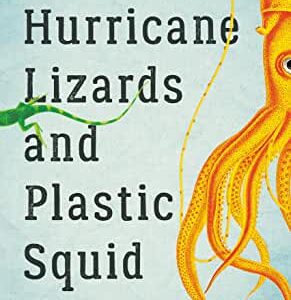When Not Hopeful, Be Stubborn
The third book in our book group’s Climate Change series was Hurricane Lizards and Plastic Squid by the Pacific Northwest author, Thor Hanson. It’s a terrific read and I encourage you to check it out.
 Through a personal connection between a member of our book group and the author, we were able to zoom Hanson in for a portion of our recent gathering. When asked the inevitable question about where he finds hope in the face of the challenges of something so big as climate change, Hanson invoked his Norwegian heritage. “Well, I’m a Norwegian, so if I’m not feeling all that hopeful at any given moment, I can at least be stubborn.”
Through a personal connection between a member of our book group and the author, we were able to zoom Hanson in for a portion of our recent gathering. When asked the inevitable question about where he finds hope in the face of the challenges of something so big as climate change, Hanson invoked his Norwegian heritage. “Well, I’m a Norwegian, so if I’m not feeling all that hopeful at any given moment, I can at least be stubborn.”
It was a clever quip, but also a down-to-earth profundity. Sometimes, in all sorts of situations, we get discouraged. We may not — on any given day — brim with hope. But we can be stubborn. We can keep at it, whatever it may be: whether trying to combat climate change, showing up for work and family, advocating for a long-shot candidate we believe in, staying at some project or endeavor in our church or community or just making sure we get to the gym or say our prayers. Persistence cannot be underrated.
Hurricane Lizards and Plastic Squid may seem an odd title, but it works as Hanson, who lives on San Juan Island, describes how different species are adapting to climate change brought on by human introduction of too much carbon into earth’s atmosphere through the use of fossil fuels. Some lizards manage to hang on, literally, amid intensifying hurricanes by evolving larger toe pads. Plastic squid doesn’t refer to the plastic in the oceans, but to the “plasticity” of squid who are adjusting to warming oceans by also evolving how and where they live.
They are among many species that are doing the best they can to respond to a warming atmosphere. Their adaptations are happening all around us, often in our own back yards, both literal or metaphorical. Hanson groups the responses of a host of species under four headings: move, adapt, evolve and take refuge. He looks at an amazing variety of species, from the Golden-Crowned Kinglet, a little bird once resident on San Juan which has now moved north to cooler climes, to grizzly bears who call off their usual salmon catch early because prized, high-carb content berries are ripening earlier. Leaving salmon behind the bears are heading to the hills for the sugar in the berries that will help them make it through their long hibernation.
Nature is creative, but not all species adapt as well as others. Some have lost out, others will. But Hanson is clear, we humans are stressing the system. And as he argues in response to the question, what we should we humans do to combat climate change, the answer is simple: “Everything we can.” From turning off the lights when they aren’t needed, to turning down the thermostat, to making decisions to get on planes less frequently. If lizards can, in a generation or two, evolve larger toes pads, and Joshua Trees can find — with the help of birds that poop out their seeds in different climes — we humans can do our part, consuming less in the short term and changing our energy system in the longer, but not too long, term.
Between the lines in this book Hanson accomplishes something else. He makes the work of field biologists and other natural scientists exciting, even romantic. Doesn’t mean it’s easy. There are a lot of long nights in wet storms. But overall Hanson brims with joy and enthusiasm for the work for studying what our fellow species are doing to adapt and evolving in the face of the challenges. If you know a young person who is trying to discern a vocation that calls to them, I’d recommend sharing Hanson’s work, whether this book or another. He’s prolific and accessible.
And, if you’re trying to do your part to keep earth livable and delightful for your children and grandchildren, but run short of hope some days, remember Hanson’s mantra. You can at least be stubborn in the cause. Next up in our series is Saving Us: A Climate Scientist’s Case for Hope and Healing in a Divided World by Katherine Hayhoe.
![Anthony B. Robinson [logo]](https://www.anthonybrobinson.com/wp-content/themes/anthonybrobinson/images/logo.png)
![Anthony B. Robinson [logo]](https://www.anthonybrobinson.com/wp-content/themes/anthonybrobinson/images/logo-print.png)